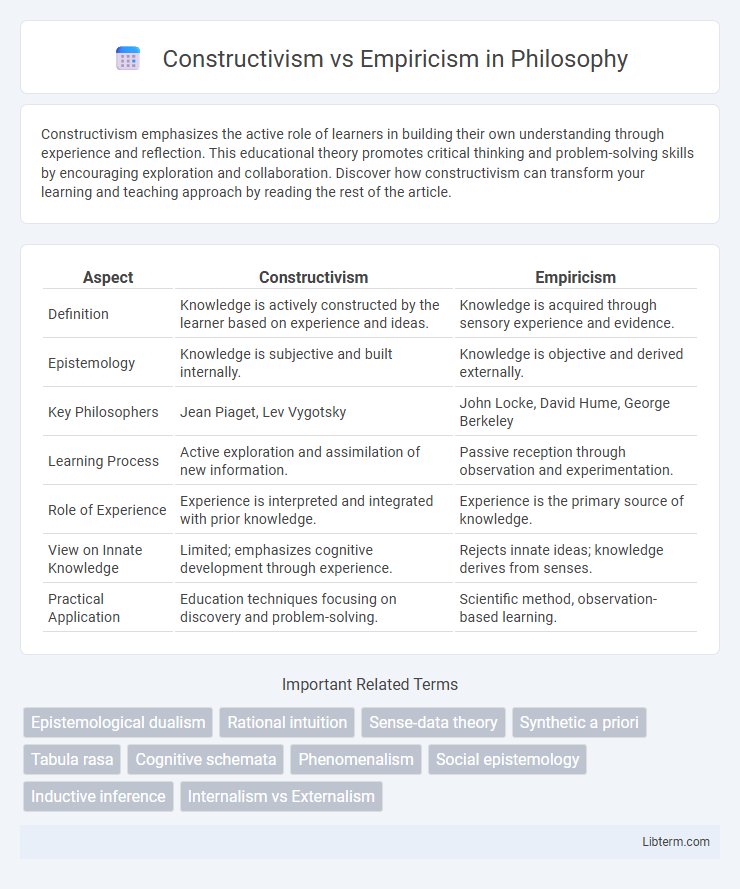Constructivism emphasizes the active role of learners in building their own understanding through experience and reflection. This educational theory promotes critical thinking and problem-solving skills by encouraging exploration and collaboration. Discover how constructivism can transform your learning and teaching approach by reading the rest of the article.
Table of Comparison
| Aspect | Constructivism | Empiricism |
|---|---|---|
| Definition | Knowledge is actively constructed by the learner based on experience and ideas. | Knowledge is acquired through sensory experience and evidence. |
| Epistemology | Knowledge is subjective and built internally. | Knowledge is objective and derived externally. |
| Key Philosophers | Jean Piaget, Lev Vygotsky | John Locke, David Hume, George Berkeley |
| Learning Process | Active exploration and assimilation of new information. | Passive reception through observation and experimentation. |
| Role of Experience | Experience is interpreted and integrated with prior knowledge. | Experience is the primary source of knowledge. |
| View on Innate Knowledge | Limited; emphasizes cognitive development through experience. | Rejects innate ideas; knowledge derives from senses. |
| Practical Application | Education techniques focusing on discovery and problem-solving. | Scientific method, observation-based learning. |
Introduction to Constructivism and Empiricism
Constructivism posits that knowledge is actively constructed by individuals through experiences and cognitive processes, emphasizing the role of prior understanding and social interactions in learning. Empiricism asserts that knowledge primarily originates from sensory experience and evidence gathered through observation and experimentation. Both paradigms highlight the importance of experience but diverge on whether knowledge is inherently built or passively acquired.
Historical Background of Constructivism
Constructivism emerged in the early 20th century through the works of psychologists like Jean Piaget and Lev Vygotsky, emphasizing the active role of learners in constructing knowledge based on experiences. This theory contrasts with Empiricism, which traces back to philosophers such as John Locke and David Hume, who argued that all knowledge derives from sensory experience. Constructivism's historical development highlights the shift from passive acquisition of information to dynamic cognitive processes in learning.
Historical Evolution of Empiricism
Empiricism emerged during the Scientific Revolution, gaining prominence through philosophers like John Locke, George Berkeley, and David Hume who emphasized sensory experience as the foundation of knowledge. This epistemological stance contrasted sharply with Constructivism, which centers on knowledge construction through cognitive processes rather than direct sensory input. Over time, Empiricism influenced the development of modern scientific methods and remains foundational in experimental research and data-driven inquiry.
Core Principles of Constructivism
Constructivism emphasizes knowledge as an active process where learners build understanding through experience and reflection, highlighting the importance of prior knowledge and social interaction. Core principles include the idea that learning is context-dependent, meaning learners construct new knowledge based on their existing cognitive framework and environmental influences. This theory contrasts with empiricism, which asserts that knowledge primarily derives from sensory experience, by focusing on the internal processes shaping knowledge rather than external data alone.
Key Tenets of Empiricism
Empiricism emphasizes that all knowledge originates from sensory experience, asserting that the mind begins as a blank slate (tabula rasa) and is shaped through observation and experimentation. It prioritizes evidence-based learning through perception, rejecting innate ideas or a priori knowledge as sources of understanding. Key tenets include reliance on inductive reasoning and empirical methods to derive general principles from specific observations.
Constructivist Perspectives on Knowledge Acquisition
Constructivist perspectives on knowledge acquisition emphasize that learners actively build their own understanding through experiences and reflection, rather than passively receiving information. Knowledge is seen as a dynamic, contextual process shaped by social interactions and prior knowledge, highlighting the role of cognitive development and scaffolding. This approach contrasts with empiricism by prioritizing meaning-making and internal mental processes over sensory data alone.
Empiricist Approaches to Understanding Reality
Empiricist approaches to understanding reality emphasize knowledge derived from sensory experience and observation, positing that the mind begins as a blank slate shaped by empirical data. Key figures like John Locke and David Hume argue that all ideas and concepts originate from direct interaction with the external world, rejecting innate knowledge claims. Empiricism values systematic experimentation and evidence-based reasoning as essential methods for acquiring accurate knowledge about reality.
Major Debates: Constructivism vs Empiricism
Constructivism asserts that knowledge is actively constructed by learners through experience and internal processes, emphasizing the role of prior knowledge and cognitive frameworks. In contrast, Empiricism holds that knowledge originates primarily from sensory experience and evidence gathered through observation and experimentation. The major debate centers on whether cognition is primarily shaped by innate structures and mental constructs (Constructivism) or grounded in empirical data and sensory input (Empiricism).
Implications in Education and Learning
Constructivism emphasizes active, learner-centered education where knowledge is built through experience, promoting critical thinking and problem-solving skills. Empiricism focuses on sensory experience as the foundation of knowledge, encouraging observation and evidence-based learning through experimentation and practice. Integrating both approaches can enhance educational outcomes by combining experiential learning with empirical validation to support deeper understanding and retention.
Contemporary Relevance and Future Trends
Constructivism emphasizes knowledge as actively built through experience and social interaction, influencing modern education by promoting learner-centered, inquiry-based approaches that enhance critical thinking skills. Empiricism focuses on sensory experience as the primary source of knowledge, underpinning data-driven methodologies and evidence-based practices in scientific research and technology development. Future trends suggest a convergence where constructivist strategies integrate empirical data analysis, fostering adaptive learning systems and personalized educational technologies.
Constructivism Infographic

 libterm.com
libterm.com